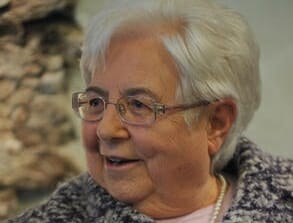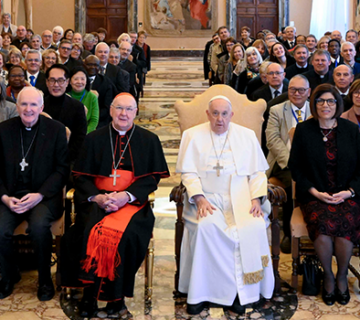 When Pope Francis met the General Assembly of the Focolare Movement last September he spoke of Chiara Lubich as an “extraordinary witness” to unity who “brought the fragrance of Jesus to so many human realities and to so many parts of the world”. Today, seven years after the death of the founder, the Focolare Movement reaffirms its vocation to be a school of communion and a hive of unity for the whole Church as Maria Voce explains in the following interview with our paper.
When Pope Francis met the General Assembly of the Focolare Movement last September he spoke of Chiara Lubich as an “extraordinary witness” to unity who “brought the fragrance of Jesus to so many human realities and to so many parts of the world”. Today, seven years after the death of the founder, the Focolare Movement reaffirms its vocation to be a school of communion and a hive of unity for the whole Church as Maria Voce explains in the following interview with our paper.
Do you believe that Chiara’s charism of unity is destined to be fulfilled?
Do you think that if I did not believe this I would have given my life to the Movement? We believe that unity will be fulfilled because it is the very thing Jesus asked for in his prayer to the Father: may they all be one. And we cannot imagine that the prayer of the Son of God cannot be fulfilled. Of course, we don’t know how it will come about, we don’t know when, but we are giving our lives so that it can be achieved. We want it to happen and each day we take small steps forward so as to hasten the day when it will be completely fulfilled.
What does “being a family” mean according to Chiara’s legacy?
When I was elected the first time I said my hope was that the Focolare would give precedence to relationships. I believe that, at root, this is what we have tried to do, even though there is always the danger of individualism. Building relationships with people who are within the Movement means truly being interested in the others and having a love that can understand, forgive, take on board and help when there is a need: all that happens in a natural family. We want to live as a family, but a genuine family, one founded on true and authentic relationships….
What role do the movements have in the Church today?
It is a twofold role: on the one hand the movements are bearers of charisms, which are gifts of the Holy Spirit for the Church and the world. They have an influence on the whole Church, because they are available to everyone so as to build up the ecclesial body. … Within each movement there is also a drive towards a more radical gospel life.
Their members want to be more committed, to be open to the world around them. These are characteristics that the movements try to live but which really apply to all Christians. … In movements and associations people can help each other: we can discover the value of being alongside one another, so as to give each other a hand, encourage and support each other and also to help get up again if we fall. …
Pope Francis entrusted three words to the recent Assembly: to contemplate, to go out, to study. How are you doing this?
Pope Francis quoted something Chiara Lubich had said: this is the great attraction of modern times, to penetrate to the highest contemplation whilst mingling with everyone, one person alongside others. Chiara always taught us that we must become Jesus. So, to contemplate means being Jesus, becoming Jesus, living the Gospel to the full, managing to discover all that Jesus is doing in history, what he wants to tell us through all the people we meet. …
Regarding going out, this is one of our priorities. We felt it even more strongly when Pope Francis emphasised it and we felt the joy of being in harmony with what the Pope is asking of us today. To study means for us, above all, continually revisiting our charism, not so as to change it in any way but to see how it is responding today to the signs of the times, being able to understand the language, the approaches and the new questions arising in the world today. We take this on board so as to express the one charism in today’s world.
What priorities do you as President have for the future of the Movement?
I am not the one who decides on the priorities. I need to discern them through what is expressed by the Movement all over the world. The important thing which emerged from the recent assembly is to be very open and to go out towards the peripheries, the margins, which are not only geographical peripheries but wherever love is missing and where divisions block the way to achieving the spirit of unity of the charism Chiara left us. … This leads as a result to giving special attention to places where those divisions are most obvious. This means countries where there are huge differences in standards of living, or where religious differences become causes of conflict, war and terrorism. We would like to put resources and skills into these countries in particular so as to do all we can to help. But of course we must not forget Europe which has cut itself off from its spiritual roots. We want to continue to dialogue with post-modern culture, with the ‘dark night’ which seems to envelop people’s lives today.
By Nicola Gor, in the Osservatore Romano of 18th March 2015
The whole interview in Italian is available via the link below


 Italiano
Italiano Español
Español Français
Français Português
Português




No comment